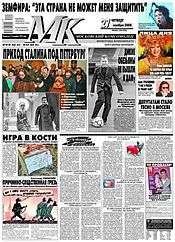Moskovskij Komsomolets
|
The front page of MK (PDF ver.) on November 27, 2008. | |
| Type | Daily newspaper |
|---|---|
| Format | Tabloid |
| Editor-in-chief | Pavel Gusev |
| Founded | 1919 |
| Language | Russian |
| Headquarters |
Moscow, Russia 123995, г. Москва, ул. 1905 года, д. 7, стр. 1. |
| Circulation | 930,000[1] |
| ISSN | 1562-1987 |
| Website | www.mk.ru |
Moskovskij Komsomolets (Russian: Московский комсомолец, "Moscow Komsomolets") is a Moscow-based daily newspaper with a circulation approaching one million, covering general news.[2] Founded in 1919, it is now regarded as publishing sensational or provocative items on Russian politics and society.[3]
History
The newspaper was first published by the Moscow Committee of the Komsomol on 11 December 1919 as Yuny Kommunar (Russian: Юный коммунар, "Young Kommunar"). Over the next years it changed its name several time, starting a few months after the first issue when it became the Yunosheskaya Pravda (Russian: Юношеская правда, "Youth Truth"). In 1924, after Lenin’s death, it was renamed to Molodoy Leninets (Russian: Молодой ленинец, "Leninist-to-Be"). It took its present-day name in September 1929.[4]
Between 1931 and 1939 the paper ceased publication. It was revived in 1940 but not for long: the war interrupted publishing again in August 1941. Publishing resumed only on 2 October 1945. Until 1990 it served as the organ of the Moscow Committee and the Moscow City Committee of the All-Union Leninist Young Communist League. In 1991 it was taken over by its editorial staff.[4]
Editors-in-Chief
Since 1983 Pavel Gusev (Russian: Павел Николаевич Гусев, born 4 April 1949 in Moscow) serves as MK’s editor-in-chief.[5]
Previous editors-in-chief
- Lev Gushchin (Russian: Лев Никитович Гущин), 1977-1983.
- Arkady Udaltsov (Russian: Аркадий Петрович Удальцов), 1968-1974.
- Aleksandr Subbotin (Russian: Александр Михайлович Субботин), 1951-1958.
Contents
The paper specialises in topical social and political material, economic surveys, city news, urban chronicles and diverse information.[4]
ZD Awards
MK is also known as the host of Russia's oldest hit parade - the Zvukovaya Dorozhka (Russian: Звуковая Дорожка, "sound track"). It was founded in autumn 1975 by Artur Gasparyan and has been published monthly in the paper since 1977.[6] Also called the ZD Awards, it features both Russian and international acts. Since 2003 it is presented in a ceremony in concert halls. It’s considered one of the major Russian music awards.[7]
Circulation
According to a poll conducted in May 2004 by the Levada Center, 9% of the Russians and 33% of the Moscovites who responded, read the paper "more or less regularly". For the year 2000 the poll reports 11% and 40%, respectively.[8]
It has a printed circulation of between 700,000[4] and 930,000[1] copies.
See also
References
- 1 2 Московский Комсомолец [Moskovsky Komsomolets] (in Russian). РИА О'Кей. 7 June 2004. Archived from the original on 3 July 2014. Retrieved 22 October 2014.
- ↑ "Moskovskiy Komsomolets". Mondo Times. Retrieved 1 October 2009.
- ↑ Размещение рекламы в газете Московский комсомолец (МК)
- 1 2 3 4 Газета "Московский комсомолец". Справка
- ↑ Гусев Павел Николаевич [Gusev Pavel Nikolayevich] (in Russian). Civic Chamber of the Russian Federation. Retrieved 22 October 2014.
- ↑ Погодин, Сергей (16 April 2013). "Звуковая Дорожка. ZD-Awards 2013! 19 апреля «Известия Холл»" [Zvukovaya Dorozhka. ZD-Awards 2013! 19 April in Izvestiya Hall] (in Russian). Musicafish.ru. Archived from the original on 25 April 2013. Retrieved 22 October 2014.
- ↑ "ZD Awards to Take Place in Izvestia Hall". TopHit.ru. 11 April 2013. Retrieved 22 October 2014.
- ↑ Чтение газет в России и Москве [Reading of newspaper in Russia and Moscow] (in Russian). Levada Center. 7 June 2004. Archived from the original on 2 April 2008. Retrieved 22 October 2014.
External links
- Official website (Russian)
